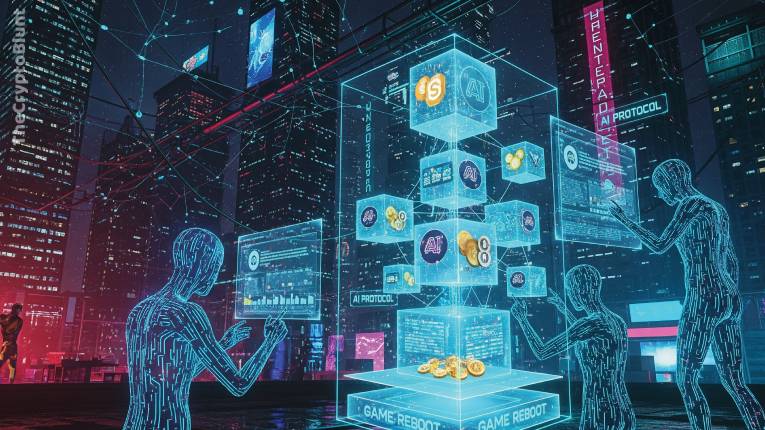The Web3 gaming sector has transitioned from speculative models to a focus on sustainability, enhanced gameplay, and robust infrastructure. The current market correction is being viewed as a necessary reset by a game developer director, who believes it will eliminate projects lacking fundamentals and clear a path for stable growth.
The Reset of Web3 Gaming: A Path to Stability
Over recent years, the Web3 gaming sector has experienced a notable transformation, transitioning from hype-driven and speculative play-to-earn (P2E) models to a greater emphasis on sustainability, enhanced gameplay, and improved infrastructure. The current market correction is largely viewed by Web3 game developers as a healthy and necessary reset.
According to Manfred Pack, the game development director at DAR Open Network, the focus has shifted from unsustainable speculation to building long-term value. Pack believes the initial hype around non-fungible tokens (NFTs) and P2E models was always unsustainable. The market correction, he argues, has effectively cleared the way for more stable growth by weeding out projects that lacked fundamentals.
According to Pack, the developers who have remained in the space are no longer “chasing speculation” but are instead committed to creating games that are designed to last. he believes blockchain is not a shortcut to success, and a game must first be fun and engaging, with blockchain features simply enhancing the core experience.
The Basis for Developer Confidence
The confidence among developers stems from several key convictions, as was stated by Pack. First, they believe that digital ownership is a fundamental and permanent change in the industry.
“Confidence in Web3 gaming comes from the conviction that digital ownership is a structural shift, the steady maturation of infrastructure like wallets, scalability, and standards, and the realization that blockchain is not a shortcut to success,” he argues.
The development director also believes the underlying infrastructure of Web3 has steadily matured, with significant improvements in wallets, scalability solutions, and industry standards. Developers, for their part, have learned from past failures, recognizing that a sustainable game economy must be built on genuine gameplay and community participation, not just tokenomics.
Pack also noted that the speculative bubble was not solely the result of actions by developers.
Investors poured capital into projects driven by hype and lacking fundamentals, which fueled volatility and made the correction inevitable. But this reset has cleared the way for more sustainable growth, according to the director.
The Ascent of AI Agents
The convergence of artificial intelligence (AI) and Web3 is creating a new era for gaming, moving beyond simple bots and pre-scripted behaviors. While the initial hype around AI in games was driven by a narrow set of capabilities, the technology’s proponents believe the true revolution is just beginning. Pack, like other gaming experts, insists that more impactful innovations are on the horizon. He also adds:
The more impactful innovations, such as AI-driven PvP agents that can learn and adapt to player strategies, or fully ‘lifelike’ non-player characters that can interact meaningfully over time, require significantly more development and research. These are complex systems that take time to mature.
In the long run, these AI agents have the potential to fundamentally transform gaming by creating dynamic, persistent worlds where players’ actions shape experiences. These agents can also “enhance the social and economic dimensions of games, particularly in blockchain-enabled ecosystems where agent-driven economies and interactions can coexist with player-driven content.”
The Challenge of Interoperability
Despite its steady evolution over the past few years, the Web3 gaming industry is considered to have failed to deliver on one of its most ambitious promises: a truly seamless cross-game experience. The influx of innovation and capital has not helped developers deploy games that live up to the vision of Web3.
Pack links this apparent failure to a major weakness of the blockchain industry, which is a lack of interoperability.
“The biggest challenge is interoperability. Each blockchain and game often uses different standards, which makes seamless portability difficult. Bridges help but bring added complexity, costs, and security risks,” the director states.
In addition, Pack also identifies the challenges of balancing progression and economies across multiple games as another key hurdle to attaining a truly seamless gaming experience. Furthermore, some gaming studios are reluctant to let external assets into their economies, as this is seen to dilute monetization or disrupt player progression.
To make interoperability succeed, Pack says, “we need both technical frameworks and business models that make collaboration worthwhile.” According to Pack, DAR Open Network is an example of a Web3 gaming ecosystem that has been created to overcome this interoperability challenge, as it allows for the transfer of data, assets, and value between different networks. He also asserts that DAR Open Network’s chain-agnostic design makes it possible to deliver cross-game interoperability and shared experiences without forcing users to constantly move assets or manage complex onchain processes.
Regulation and Public Trust: Key to Web3 Gaming’s Future
Turning to regulation or the lack thereof, Pack admits that this remains a major hurdle, as different jurisdictions’ classification of tokens or NFTs ultimately “slows innovation and creates risks when experimenting with new models.” However, most developers still acknowledge the importance of regulation for the Web3 gaming industry.
“Still, most developers acknowledge that well-designed regulations are essential. They bring clarity, protect players, and create a stable foundation for long-term growth,” he asserts.
Pack acknowledges that failed early Web3 games caused immense damage to public trust, and that restoring this trust may be the industry’s biggest challenge yet. Looking ahead, the director believes partnerships between studios, infrastructure providers, and ecosystems will be key to the Web3 gaming industry as it attempts to give users a truly seamless cross-game experience.
















